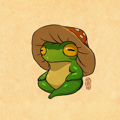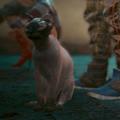(original com links → sol2070.in/2024/04/floresta-e-o-nome-do-mundo-ursula-le-guin/ )
"Floresta é o Nome do Mundo" (The Word for World Is Forest, 1972) é uma das consagradas ficções da imortal Ursula K. Le Guin. Ganhou o prêmio Hugo, talvez os mais importante da literatura de ficção científica. Como o nome e capa (da bela edição da Morro Branco) sugerem, é uma história ecológica.
Hoje, 52 anos depois da publicação, a sinopse pode soar batida: homens com as piores intenções aterrizam num planeta de natureza prístina e são confrontados pelo povo nativo alienígena. Como em Avatar, a tragédia básica por trás desse contexto interestelar é a velha e recorrente exploração geno-ecocida — também muito viva fora da ficção, principalmente em regiões onde ainda há florestas e indígenas, como o Brasil.
O que faz toda a diferença é Le Guin, com sua sutil sensibilidade para interações entre corações e mentes, o olhar mágico da natureza e o poder de tocar, despertar e refletir uma sabedoria interna até então dormente.
O livro ficou mais relevante do que nunca. Diante da realidade atual, os exploradores da história parecem saltar das páginas mais vivos, devido à espantosa semelhança com a mentalidade de extrema-direita que vem se disseminando pelo planeta.
O modo como Ursula pinta o mundo natural e suas interconexões é dos mais cativantes. Durante essas cenas, eu precisava parar e respirar, como se estivesse entrando em um estado alterado de consciência.
O pano de fundo é a mesma cosmologia hainiana de outras dezenas de livros e contos da autora, entre eles os amados "A Mãe Esquerda da Escuridão" e "Os Despossuídos" — os maiores clássicos sci-fi sobre fluidez de gênero e anarquismo, respectivamente. Hain é a civilização galática mais antiga desse universo, sendo a origem da vida em diversos planetas, entre eles a Terra.
"Floresta…" estava na minha lista de leitura há anos. O que ativou um impulso irresistível de finalmente lê-lo foi outra ficção ecológica de Ursula: o conto "Vaster Than Empires and More Slow" (1971).
Está pulsando até agora dentro de mim. É uma despedaçadora e magnífica história sobre despertencimento, natureza e redenção, também nesse universo hainiano. Uma mistura de Solaris com aqueles mitos imemoriais sobre a sonhada chegada ao lar. Faz parte de coletâneas como "The Wind’s Twelve Quarters" ou "The Big Book of Science Fiction".
Uma dica para quem for ler: a referência do título completa e expande muito o conto. É uma frase de um poema romântico e metafísico do século 17:
"My vegetable love should grow
Vaster than empires and more slow;"
Imperdível para quem gosta de ficção científica e ecologia.















